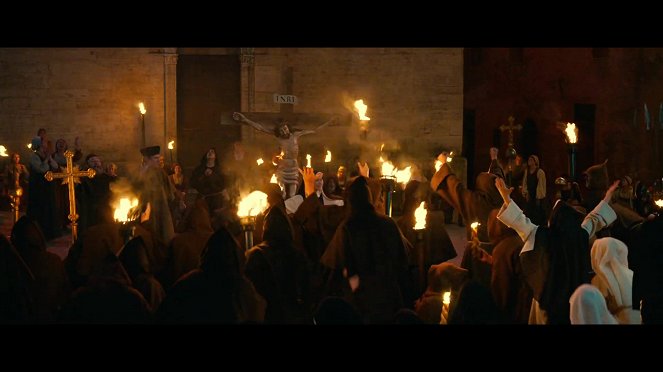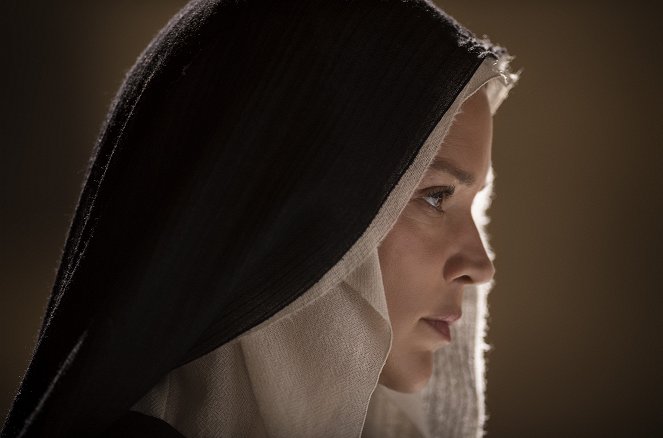Realização:
Paul VerhoevenCâmara:
Jeanne LapoirieMúsica:
Anne DudleyElenco:
Virginie Efira, Charlotte Rampling, Daphne Patakia, Lambert Wilson, Olivier Rabourdin, Clotilde Courau, Louise Chevillotte, Hervé Pierre, Alexia ChardardStreaming (1)
Conteúdos(1)
In the late 17th century, with plague ravaging the land, Benedetta Carlini joins the convent in Pescia, Tuscany, as a novice. Capable from an early age of performing miracles, Benedetta’s impact on life in the community is immediate and momentous. (Pathé Films)
Vídeos (6)
Críticas (9)
Um filme erótico sobre freiras, ambientado num convento italiano do século XVII num pano de fundo de uma epidemia de peste. É uma tentativa bastante inconsistente de elevar a base do filme B, inspirada na tradição de filmes de exploração principalmente italiana com freiras (a chamada «nunsploitation»), para um nível de festival de filme A. Paul Verhoeven plantou nela as suas características e obsessões favoritas, incluindo, por exemplo, a ironia forte, o sadismo e a perversão, ou o feminismo, neste caso temperado com uma crítica caricata da Igreja como uma instituição hipócrita controlada por interesses de poder e que se opõe à liberdade sexual. A sua heroína, uma jovem freira com visões muito vivas da revelação de Cristo e passando por um despertar lésbico com uma recém-chegada, é seguida desde a infância numa série de escapadelas sacrílegas cujas verdadeiras origens envoltas em mistério (talvez um verdadeiro milagre de Deus, talvez uma peça teatral com uma agenda de autosserviço) conduzem todo o filme. Durante a maior parte do tempo, o filme está dividido entre uma farsa de humor negro flácido sobre o aproveitamento da credulidade dos fiéis (com peidos, defecação, temas pornográficos obscenos e a figura de Jesus Cristo como protetor, que descapitaliza corajosamente tanto inimigos como bestas), e um drama sério e angustiante com música séria e violência naturalista sobre uma mulher delirante inclinada para a auto-mutilação e os efeitos negativos da fé fanática. O conflito entre estas duas abordagens tonalmente contraditórias parece bastante problemático e insatisfatório, mas Verhoeven pode muito bem não se importar, porque provavelmente só queria divertir-se e também provocar e escandalizar um pouco, o que ele conseguiu fazer. Também por esta razão, Benedetta pertence à categoria de entretenimento de guilty-pleasure no limite, adequado para as exibições da meia-noite do festival, e no qual não são as atuações das amantes as que mais brilham, mas sim Charlotte Rampling no papel secundário (mas essencial e notável) da abadessa cética.
()
Tenho a sensação que Paul Verhoeven, depois dos oitenta, já não tem com certeza necessidade de agradar a ninguém e que, por isso, fez um novo filme principalmente para si mesmo e inteiramente de acordo com o seu próprio gosto. Para mim, o resultado é um puro "nunsploitation" B, ao invés de um filme de arte A onde o diretor novamente demonstra o seu grande sentido de provocação e humor negro. Ainda estou totalmente sintonizado com a sua onda, por isso provavelmente vou desfrutar qualquer coisa que ele me sirva, mas de outra forma parece-me claro que Benedetta não é certamente um filme para qualquer um. [KVIFF 2021]
()
In an effort to track down the truth about the life of the lesbian nun Benedetta Carlini, Verhoeven employs the formula of historical biography to analyse the Church’s model of power, in which faith is only one of the means of survival and maintaining dominance. Until the end, the film does not give a clear answer as to whether the protagonist really communicates with saints and possesses mystical abilities, or whether she is merely capable of exploiting the fears of others. Due to the impossibility of a rational explanation of some of the events depicted in the film, both interpretations remain possible. As in Total Recall , there is not a clearly defined line between reality and illusions or dreams. In any case, the Dutch filmmaker approaches belief in the supernatural with cynical humour and a sense of the grotesque, both of which are apparent in the arrangement of the mise-en-scene, working with the aesthetics of contradiction and ambiguity, and in the composition of the shots. As a complex, ambivalent female character, Benedetta alternately elicits sympathy and repulsion. Though she promises her followers protection from the plague that is decimating the Italian population, she mainly pursues her own gratification. Salvation and redemption are only illusions. Unlike the unquestioningly listening, frightened and thus easily manipulated crowd, we see that it is not Jesus but rather the closed city gates that provide protection against the disease. No divine forces, just a lockdown. Besides her intelligence and charisma, what makes her a credible religious figure are the stigmata that she inflicts on herself with a shard of glass. Consequently, she can determine what God’s will is and cheerfully abuse the fact that each of the nuns interprets the language of God in her own way. For Verhoeven, religion is not a matter of inner conviction, but rather a culturally, geographically and historically defined phenomenon that serves momentary biological needs and the interests of power. Anything can be justified by God. A similar approach to the clergy is taken by other representatives of the Church, whose hypocrisy Benedetta points out through her own deeds as she retreats into the background in the second half of the film. After the arrival of the nuncio, she changes from a character who abused power in an ethically dubious way to a representative of the resistance against the system, using her own body and sexuality for emancipation. The struggle for dominance, which sets the dynamics of the narrative, is thus unpredictable and suspenseful until the final minutes of the film. Verhoeven typically is not judgmental, nor does he cheer for any side. With a sociological interest, he only studies from afar how easily – regardless of the period – faith can be transformed into an instrument of control and how much a person’s value and power depend on the given historical situation. 85%
()
Lesbian nunspoitation by Verhoeven set in a 17th century Tuscan monastery. Verhoeven has made an unconventional erotic religious drama that is not afraid of nudity and violence. The actress who plays Benedetta, Virginie Efira, looks very good at 45, and her full frontal nude will please many a male eye, but the rebellious Daphne Patakia looks good too – she is the hottest nun I have ever seen. The combination of sinful nuns and a corrupt Christian institution works surprisingly well. The historical period where Europe was gripped by the Plague, the very intense and exciting lesbian sex scenes, the Stigmata vignettes, the great nightmares of Benedetta (the snake scene or the brutal killing of the knights, surprised by the raw gore). I liked the harsh rules the nuns had to follow and the intense finale is solid, with a cool trial, torture and chaos of the townspeople. The pacing is slower in places, but the film managed to keep my attention thanks to the attractive interludes. Definitely a noteworthy affair.
()
Benedetta has spent most of her life in a convent, but now besides God, she started to love Bartolomea... what initially appears as a drama about forbidden love, in Paul Verhoeven's direction turns into a provocative and unpredictable story that opens up a lot of interesting topics and cleverly manipulates with the audience, their expectations, and the way it processes what happens to the protagonists on the screen. Equally daring, cynical, clever, and entertaining as the director's greatest classics.
()



Publicidade